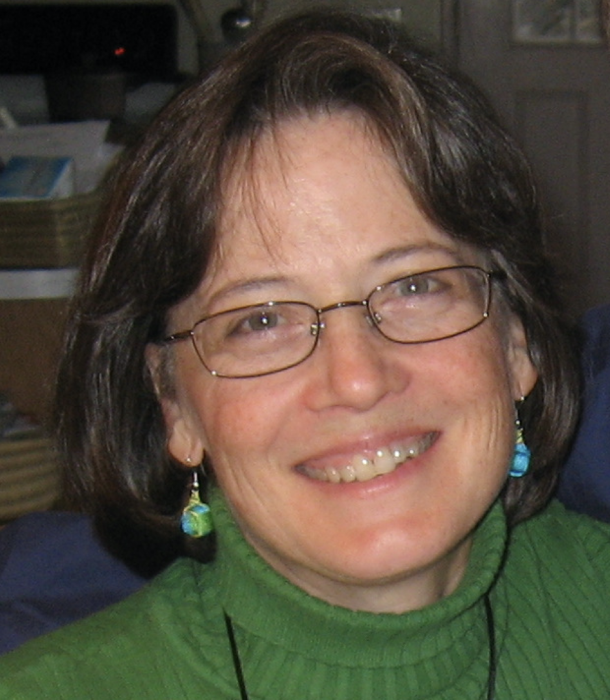 When her husband, at 55, decided he was burned out at work and wanted to go overseas to work for Peace Corps, Joyce chose to join him on his placements abroad as a “trailing spouse.” She recounts her struggle with uprooting her home and career in midlife, not to mention her change in identity, in her new book: Outside My Skin: My Midlife Detour as a Trailing Spouse in Ghana
When her husband, at 55, decided he was burned out at work and wanted to go overseas to work for Peace Corps, Joyce chose to join him on his placements abroad as a “trailing spouse.” She recounts her struggle with uprooting her home and career in midlife, not to mention her change in identity, in her new book: Outside My Skin: My Midlife Detour as a Trailing Spouse in Ghana.
Tell us a little about your background.
I was born into a Mennonite family in rural Ohio. My mother was raised Amish and went to college to become a nurse, something unusual for Amish young women of her generation, but by the time I was born, the third of five children, she had become a full-time homemaker. My father had grown up farming in Idaho, and as a young man had served under the Mennonites during World War II in a Yugoslav refugee camp in Egypt. After the war, he was sent by the Mennonites to build a hospital in Ethiopia. He then returned to the US, went to college, married and became a doctor.
Although my father was no longer a farmer, we lived on a working farm. I grew up doing farm chores, weeding the garden, “putting up” produce, and riding horses. We traveled in the summers, and I received art, piano, and violin lessons, all of which were unusual for Mennonites of my parents’ generation. My parents were also avid readers, so I learned to read before I went to kindergarten and began keeping a diary when I was in elementary school. When I was 15, my father took us with him on a sabbatical year in Puerto Rico where he worked in a Mennonite Hospital. There I learned Spanish and had my first experience in cross-cultural living.
Rural Mennonites at that time were very conservative in their attitudes toward women, and yet I remember my father telling me, “You have the ability to become anything you want to become.” Both of my parents conveyed to us children the assumption that each of us would go to college, but my father made it clear that we should chose a vocation that would allow us to be of service to the world’s needs, not just to follow an interest or “passion.” I attended Goshen College, a Mennonite college in northern Indiana, where my parents had also attended, and where the motto was “Culture for Service.” I felt I was expected to go into medicine or nursing but resisted that path, and not having the benefit of any vocational counseling, I studied an interdisciplinary course of psychology, sociology, and education, finally graduating with a degree in Elementary Education. I remember going to the bookstore at the beginning of each term to buy textbooks, and feeling drawn to the back of the store where the paints were sold. I wanted so badly to buy tubes of watercolor paints, but even though my mother was an artist, a painter in oils, I had absorbed an attitude from my parents and my church that art was not a worthy subject for a college major.
I met my husband, Bob, at Goshen College. (Coincidentally, Bob’s parents had been Mennonite missionaries and had been the first administrators of the hospital built by my father in Ethiopia, so Bob was born in the hospital my father built.) Early in our marriage, we did four years of voluntary service under the Mennonite church, first in Americus, Georgia, where I worked as an elementary teacher in the public schools, and then in Ethiopia where we both taught in an Ethiopian boarding school. I taught ESL, geography, piano and photography. Although I very much enjoyed teaching our highly-motivated high-school students in Ethiopia, I also observed the work that nurses in our mission group were doing in resettlement camps for internal refugees, and became interested in public health and infectious diseases. We lived in a house which had previously been occupied by American nurses, so our neighbors came to me for help with medical problems, expecting me to know how to help them. I learned to dress wounds, and developed a desire to study medicine.
When we returned to the US, we spent a year in northern Georgia volunteering with a group who settled international refugees, and where I again taught English as a Second Language. We then moved to West Virginia, where I began my medical studies. I was 30 when I entered medical school.
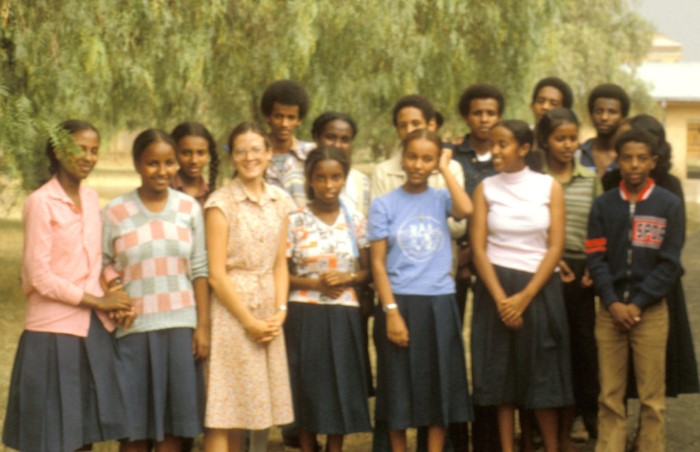
With piano students in Ethiopia, 1980
When did you start to think about making a change in midlife?
It was my husband who first forced me to think about change in midlife. The changes, which we made for his sake and which I, at first, did not even wanted to consider, eventually led to changes in my approach to midlife, and to our marriage, and also to my further discovery of some of my own buried desires.
Bob had followed me for over twenty years, through medical school, then public health school, then pediatric residency, and finally to the mountains of western North Carolina where I practiced pediatrics. Along the way, he got a master’s degree in Public Administration and found jobs as the administrator of various non-profit organizations. I had worked for fifteen years in western North Carolina, first with a pediatric group practice, then at a state agency evaluating and guiding therapy for children who were at risk for developmental disabilities, and then at a federally qualified health center taking care of Hispanic families.
I was trucking along quite happily when Bob dropped the bombshell that he was burned out on his job and wanted to uproot. By then, he had been working for 12 years as an administrator for a Family Medicine Residency Training program. He wanted to follow his own dream now, and told me it was my turn to follow him…. back to Africa. We were 55. I loved our home and community. I felt I had a true calling in my work as a pediatrician there. I did not want to go, but after much deliberation, decided reluctantly that I would, because Bob had followed me for twenty-five years and deserved the chance to follow his own dream. I did not want him to have to give it up for the sake of our marriage.

The anguish of working through that decision is what Molt, the first section of my book, Outside My Skin: My Midlife Detour as a Trailing Spouse in Ghana, is about. In that memoir, I used the metaphor of a molting snakeskin, which might sound rather painless, but the “molting” felt wrenching to me at the time.
The preparation I needed to do was emotional, psychological. I kept several quotes posted to my desktop that inspired me every morning. One was from Anais Nin, “Life shrinks or expands according to one’s courage.” And another was from Douglas Steere, “How good to remember how I have let go of what went before, and have faced and welcomed each age of my life as it came.”
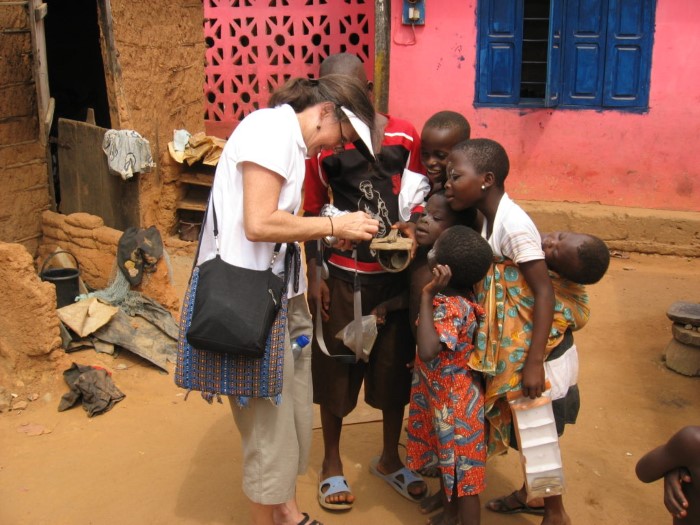
In Ghana
What challenges did you encounter?
The second section of Outside My Skin, which is called Stretch, is about the challenges I faced in the first year of Bob’s career with Peace Corps. I had to figure out how to get a medical license in Ghana and how to keep my medical career afloat while dealing with being a “Trailing Spouse” in the Foreign Service. When I first arrived in Ghana, I was very much taken aback upon realizing how dismissively the diplomatic and international aid communities viewed “Trailing Spouses,” even ones like me with well-established professional careers. Most people in the foreign service community just sort of expected me to sit back and ride along in the periphery of my spouse’s world, doing not much. Maintaining one’s ambition in that kind of environment can be a real challenge.
I was very determined, however, and I did succeed after much confusing bureaucratic process, in getting my Ghanaian license, and eventually worked at a pediatric clinic at Korle Bu Teaching Hospital in Accra, as well as at another private clinic. I also worked on the Global Health Initiative at USAID in a non-clinical capacity. Just when I felt I was getting myself established, we learned that Bob was going to be transferred to Ethiopia. I was again confronted with the realities of the trailing role in the foreign service.
Another very big emotional challenge for me that year in Ghana, and in the following years in Ethiopia, was living in the midst of extreme poverty and environmental pollution, and witnessing so much suffering in the extremely limited resources of some of the medical settings where I volunteered.
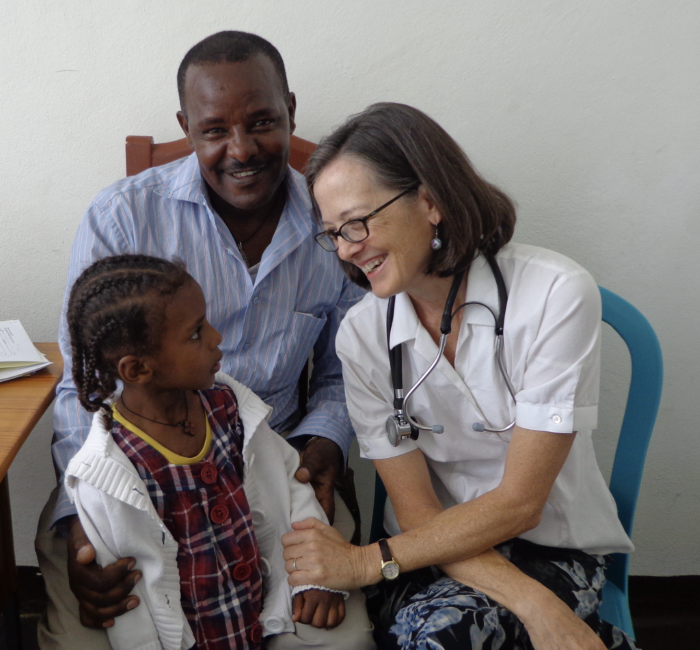
At work in Ethiopia, with a patient and her father
The third section of the memoir, Breathe, is about the four months I spent back in North Carolina, in retreat from the pressures of African poverty, and from the “Trailing Spouse” role. I had helped Bob move our household to Ethiopia and then came home to North Carolina to do some locums (stand-in) pediatric jobs. I spent a lot of time thinking about whether or not I would return to Ethiopia, and about the assumptions that we had formed early in our marriage, which were not serving us well as individuals in midlife. We were two very different people with very different needs and desires, and yet we loved each other greatly and were committed to our long-term relationship. We had to find a way to adapt our expectations of each other and the relationship.
After that summer retreat at home, I did return to Ethiopia and worked for two and a half years in the US Embassy Health Unit as their pediatrician, also volunteering in a slum clinic and at an orphanage. However, over those two and a half years, in the midst of the extreme poverty and suffering all around us, and the difficulties of providing care in the slum clinic where I volunteered, I was eventually overcome by a kind of depression which I have since learned is called “empathic distress.”
I returned to the United States when an opportunity to work with a friend and past pediatric partner arose near my home in North Carolina, thinking that Bob would be coming home in about 19 months, and that this was my chance to get back into the workforce in the US. Bob and I lived apart for 19 months.

Our home in North Carolina
What is your next act?
On the surface, it might seem that the next act that I wrote about in Outside My Skin: My Midlife Detour as a Trailing Spouse in Ghana, was the taking up of a very different kind of medical practice in a severely resource-limited and tropical environment. But frankly the really new “act” that I took up in that transition, was, ironically, the role of the “Trailing Spouse.” I took this on in midlife, in a kind of opposite order compared to what many married women experience. The experience was very tough, but also enlightening. It led to significant changes in our midlife marriage and in my midlife aspirations.
As it turns out, being the “Trailing Spouse,” was not a good fit for either Bob or me. We each needed to pursue our own dreams, our own vocation. It wasn’t healthy for either of us to think of our lives as a sacrifice, or on hold, or just supportive to the other. Our midlife marriage had to adapt to allow more independence, more freedom to live apart for stretches of time. We had been a bit too joined at the hip. Coming to this conclusion enlivened our marriage.
The 19 months that we lived apart while I was working in the US and Bob was still in Ethiopia, were of course difficult; we missed each other greatly. So, after five years of working for PC, Bob quit and came home to NC. But after several months of looking, he did not find a job he liked and was soon asked by PC to return as a DMO in Moldova. He did so while I remained back in the US still working. The US Embassy Health Clinic in Moldova already had a Moldovan pediatrician on staff, so there was no ready-made pediatric job for me to move into there. I felt no desire to practice at a clinic catering to the international community there, and when I learned about the depressing conditions in the local public facilities, I knew I did not want to face that kind of setting again. But I also hungered again for the adventure of living abroad together. So, after just two years of practicing pediatrics back in the US again, I decided to retire from pediatric practice in order to join Bob in Moldova. I felt much too young to be retiring and I worried that I would regret it. But I discovered when I got to Moldova that I had somehow forgotten to pack my stethoscope…
I am currently retired from pediatrics and am teaching and writing. I teach English as a Second Language (ESL) to young people in Moldova who are preparing for English competency tests which determine entry eligibility into international universities. This work gives me the opportunity to get to know Moldovans and to have interesting cross-cultural discussions by way of speaking practice. When I first retired, I missed the intimate connecting relationships that I had with my patients and their mothers in pediatric practice, but having these teacher-pupil relationships with my young students provides a similar vocational gratification. I love the positive energy that these young people exude.
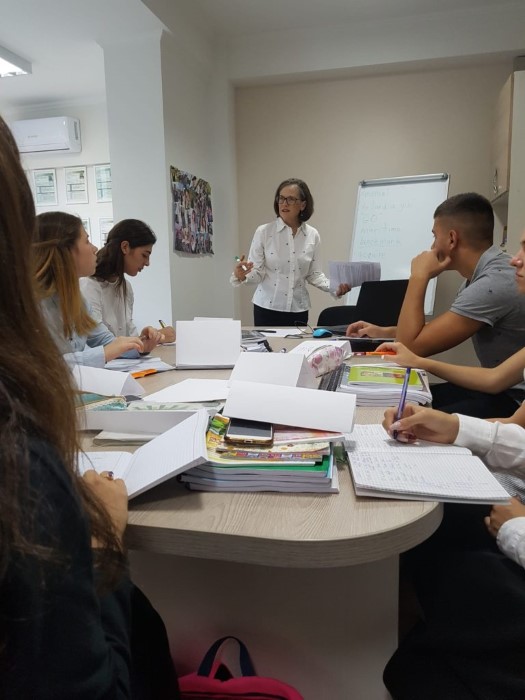
Teaching in Moldova
I have also been doing a lot of writing. Throughout my life, I have always felt the urge to write and always found time to do a bit of it, even when my son was young and I was practicing pediatrics. Many years ago, long after our first time in Ethiopia, when I was working part time and had two mornings a week to give to my writing, I wrote a memoir, The Wonji Road, (as yet unpublished) about those two volunteer years in Ethiopia. One year, I wrote a haiku every Monday morning, and compiled these into Fifty-Two Haiku, (also as yet unpublished.) Now I find that my urge to sit at my desk and write is greater than all other urges. I dedicate four mornings a week to writing. During our first two years here in Moldova, I posted regularly about life in Moldova on my blog, “Cu Placere” (which translated from Romanian means, “With Pleasure”) Outside My Skin is the first book I have published. Writing it helped me to make sense out of what I had experienced in Ghana, and to reflect on what I had learned about myself, how I had changed.
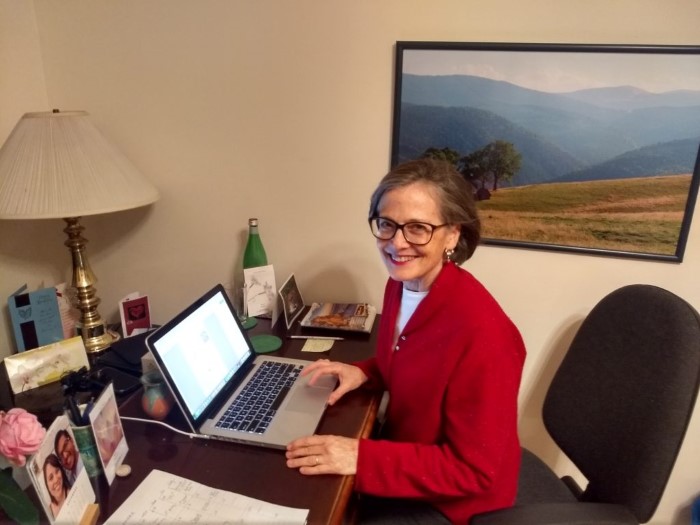
Working at my desk
I am not currently running a new business or relying on my work for income, as are many of your readers; the challenges I have faced most recently have been primarily psychological. The fear of retiring early, while I still had so much to offer from years of pediatric experience, was a great psychological challenge. But I knew I enjoyed teaching ESL and could do that again, and more importantly that I had the desire to give expression to my more creative side, through some sort of creative vocation, most likely writing. I longed to write at least one book before I died, and thought I should finally get on with it, as life can be cut short and there are no guarantees of living to an old age. I kept in front of me a quote from May Oliver: “The most regretful people on Earth are those who felt the call to creative work, who felt their own creative power restive and uprising, and yet gave it neither power nor time.”
How supportive were your family and friends?
While we were in Ghana and Ethiopia, I composed long email letters to family and friends sharing my observations of details that interested me––mostly nature and culture. So many of my friends told me that they loved reading these and encouraged me to put them into a book. It wasn’t until three and a half years after we had left Ghana that I began working on that book.
My friends and family also understood and affirmed the decision to retire early in order to take another horizon-expanding opportunity overseas. We have one son, who is now 29 years old. He had just gone off to college when Bob became restless at his work. He visited us in Ghana and Ethiopia and Moldova but never lived with us abroad. We will come home in the spring for his wedding.
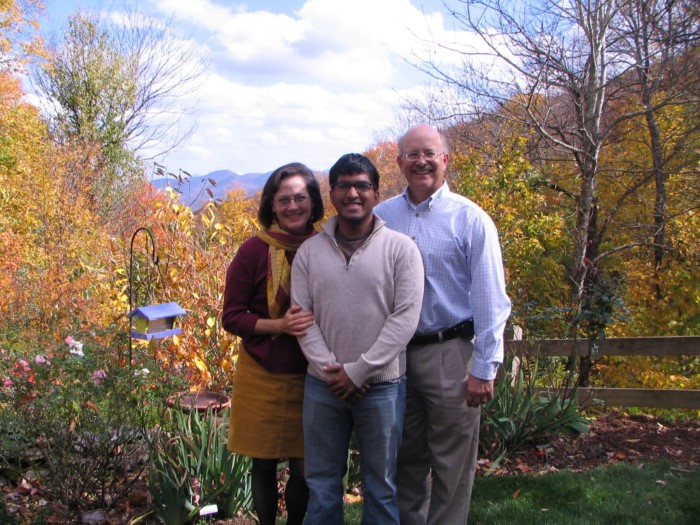
Our family in our front yard in North Carolina
What did you learn about yourself through this process?
I have learned that I am so much more adaptable than I had believed myself to be. I had expected to coast along in midlife, continuing to do what I knew best how to do, but I learned that being fully alive is about being willing to change. I would need to grow in new ways, not just in midlife, but even later in life. Being willing to push myself to take on difficult challenges, and eventually, to give up the security of my professional identity in order to become a learner again in totally new fields, has kept me more flexible, more adaptable, younger in spirit.
I have also learned that long-term marriage relationships can benefit greatly from some serious adaptations in midlife, from re-negotiation of the relationship. Marriages, like people, need to be able to change in order to thrive. Committed marriage relationships can accommodate to the changing needs of both partners in midlife, rather than break up when individual needs seem to conflict.
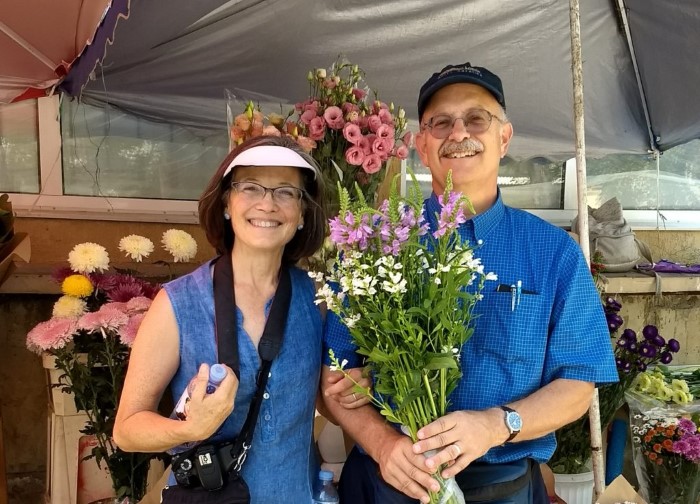
With Bob in Moldova
Looking back, is there anything you’d have done differently?
I wish I had known how glad I would be, eight years later, that we made the choice to uproot. It would have made it easier to let go of my former life if I had felt assured ahead of time of how much the next eight years would enrich our lives.
What advice do you have for women seeking reinvention in midlife or wishing to write?
I can offer inspiration more than practical advice. Don’t push aside your inner longings. Listen to your dreams, pay attention to what it is that you envy about others’ work; this is revealing. You only have one life, don’t let it get away from you.
Regarding writing: If you have not trained in creative writing, take some courses. Despite the fact that I had been journaling all of my life, when I started trying to write a book, I recognized that all those years of medical training and practice had left my creative writing skills rather shriveled. I felt the need to learn at least the basics or this craft and signed up for some online writing classes from University of Wisconsin. The feedback of their instructors was very helpful to me. The first class I took happened to be one called “From Notebook to New Work,” which enabled me to take parts of my journals and the email letters I had sent home to friends and family while we were in Ghana, and develop these into pieces of a story line, which became the narrative arc for Outside My Skin.
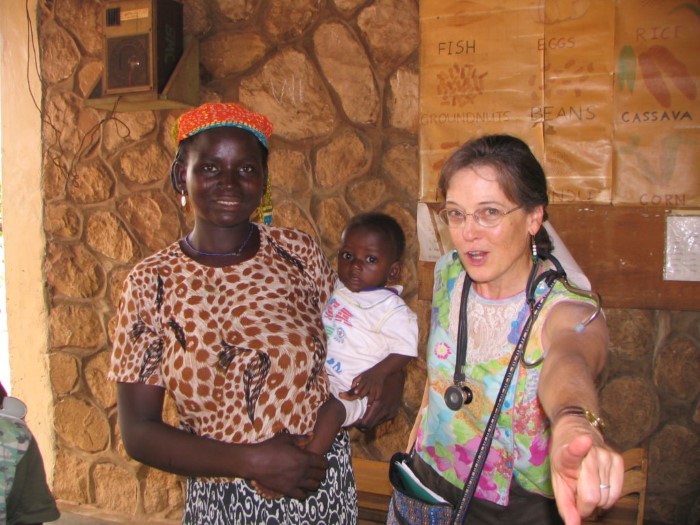
In Ghana
What resources do you recommend?
My favorite book for helping one gain insight into one’s true vocation: Let Your Life Speak: Listening for the Voice of Vocation, by Parker Palmer
Best online writing courses:
University of Wisconsin Their courses are excellent, not expensive, and can be taken at one’s own pace over the course of a year.
Online course for certifying in Teaching English as Second Language: International TEFL and TESOL Training
Books on the craft of writing:
Annie Dillard’s The Writing Life
Natalie Goldberg’s Writing Down the Bones: Freeing the Writer Within
Book on living abroad:
Trailing: A Memoir, by Kristin Louise Duncombe, another memoir about a trailing spouse’s experiences, this one in Kenya.
Books that inspire me:
All of Annie Dillard’s early books are inspiring models of observant/mindful living as well as great naturalist writing, such as Pilgrim at Tinker Creek and Teaching a Stone to Talk: Expeditions and Encounters
.
Books on midlife:
Robert Johnson’s Living Your Unlived Life: Coping with Unrealized Dreams and Fulfilling Your Purpose in the Second Half of Life
Robert Johnson’s Inner Work: Using Dreams and Active Imagination for Personal Growth
Favorite podcast:
Krista Tippett’s On Being. So many of her conversations have nurtured my spiritual/vocational journey: with John O’Donohue, Joan Halifax, Rachel Naomi Remen, Brené Brown…
Where are you now? What’s next for you?
I am now in Moldova most of the year and spend a couple of months every spring at home on my mountain. I am enjoying the freedom of not being tied down to an externally imposed work schedule. I hope to do a lot more writing in the next few years. I want to adapt some of my blog posts to craft a book about our experiences in Moldova. After that, I plan to begin a book that reflects on my experiences working in Ethiopia the second time around. I also have a couple of other book ideas on the back burner, a children’s book and a book in the inspirational genre for contemplative types.

With Bob in Ethiopia
Connect with Joyce Hooley
Email: jhooleyg@gmail.com
Blog: Cu Placere
Book: Outside My Skin: My Midlife Detour as a Trailing Spouse in Ghana
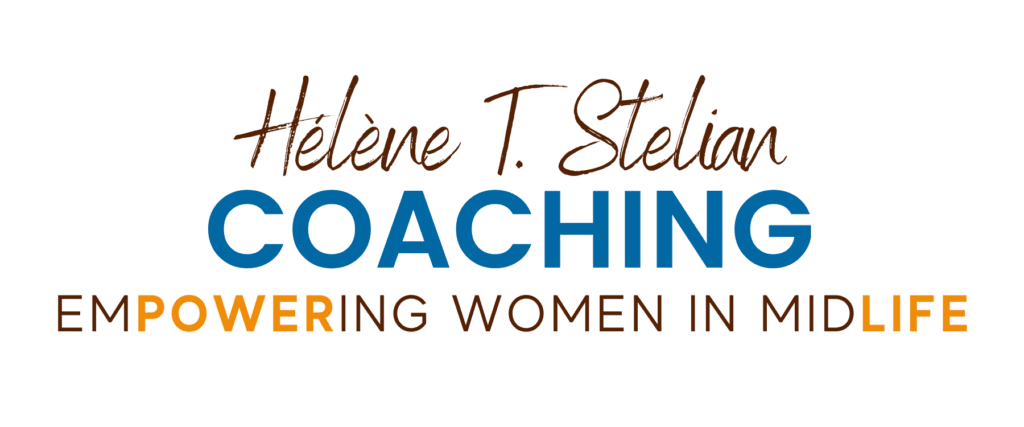

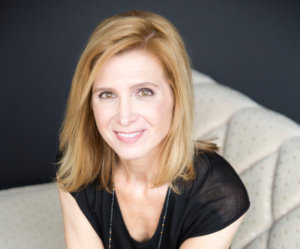
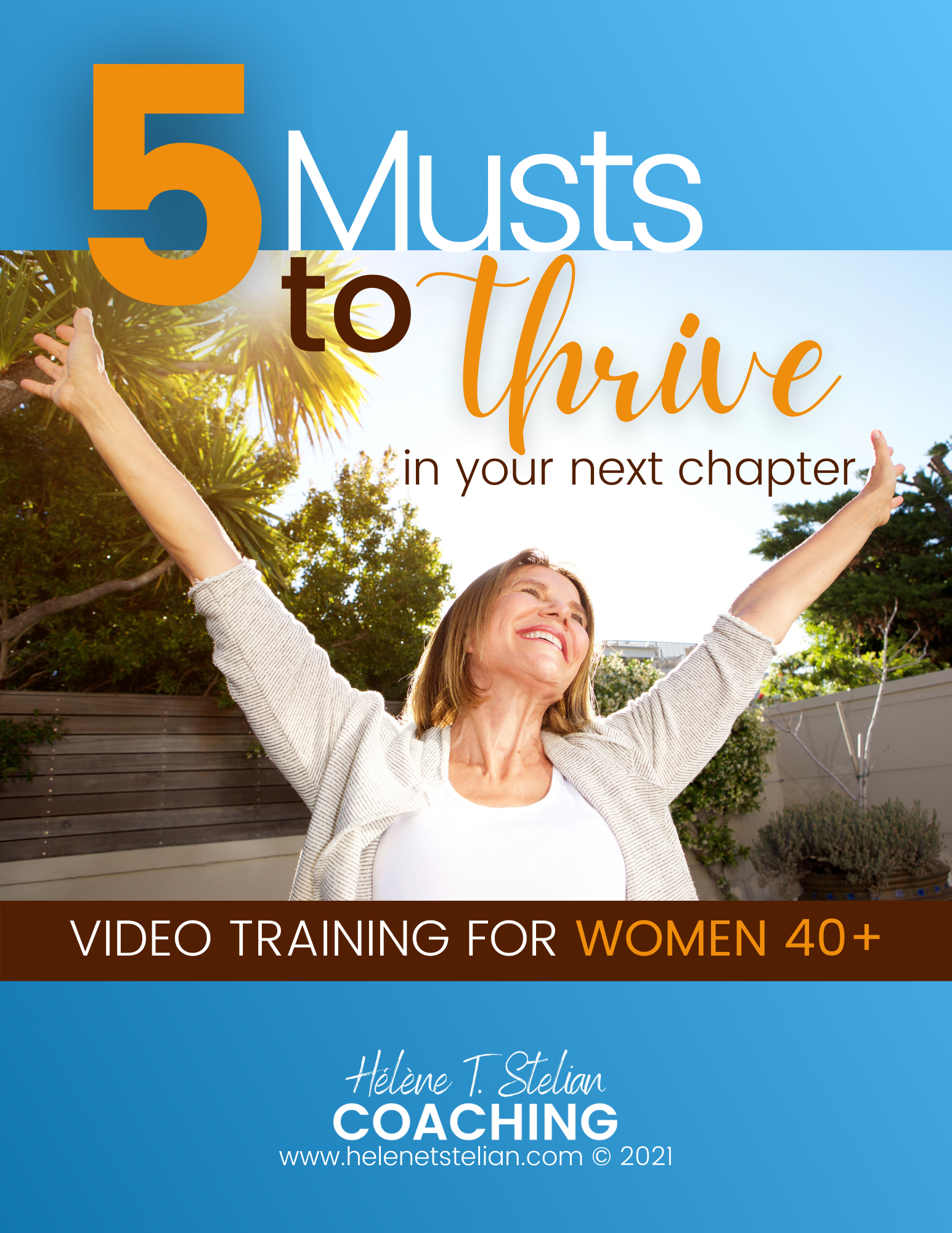



0 Comments